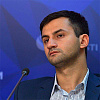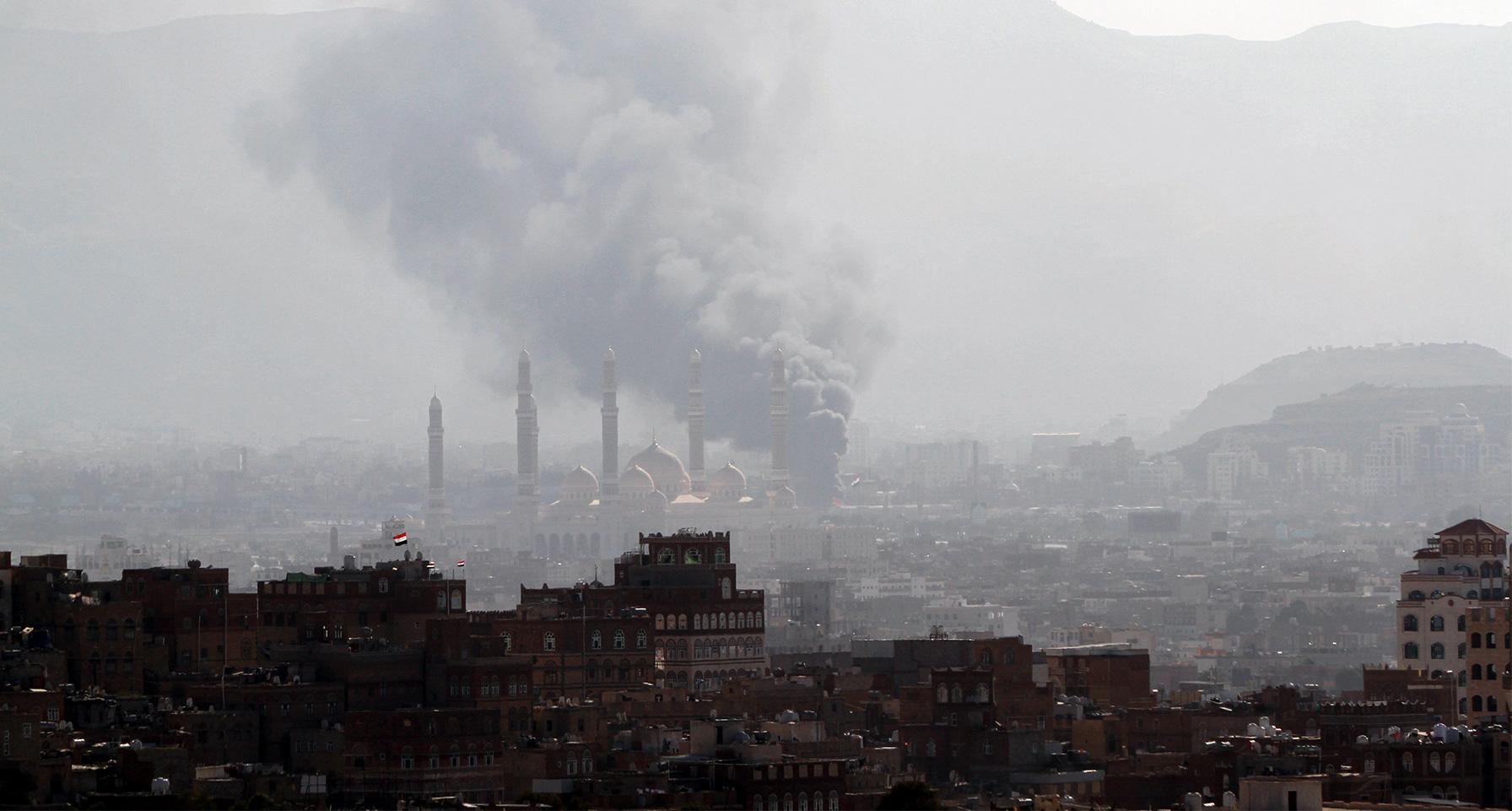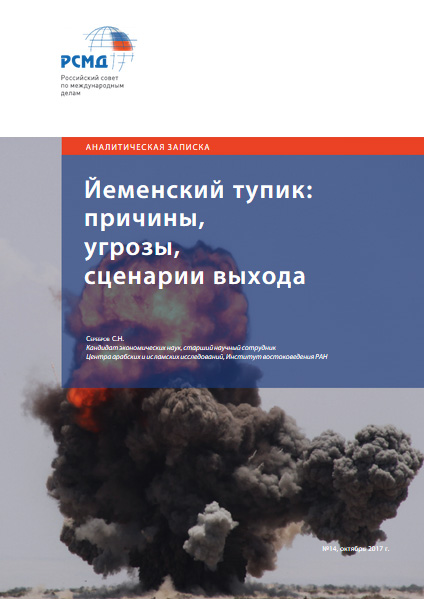On 4 December 2017, former President of Yemen Ali Abdullah Saleh was assassinated in his home country. His murder came after clashes in the Yemeni capital of Sana’a and a schism within the tactical alliance Ansar Allah (often termed “the Houthi movement” in the media) and supporters of Saleh, primarily, the Republican Guard.
Saleh’s forces were defeated, and Ahmed Ali Saleh will now have to bring together what is left of them.
The collapse of the Saleh–Houthi alliance will without a doubt tip the balance of Yemeni political forces. This does not mean, however, the change will be for the better. There is some doubts, the Coalition will finally be able to destroy all the Houthi forces. We will most likely see further fragmentation of the political forces within the country.
Russia has shown it is ready to mediate in the crisis, but nothing more. Moscow has sought to alleviate some of the tensions in its relations with Saudi Arabia on the Yemen matter, while maintaining a multi-faceted approach. It has continued to work with all the actors in the crisis on different levels. Pragmatists on every side of the conflict benefitted from Russia’s move, since it put them on a path towards political dialogue. However, it is likely that Russia will abstain from any actual action on the ground to reinforce its diplomatic efforts due to its limited resources and current foreign policy priorities. Therefore, Russia’s commitment to promoting the political process can be defined as long-term.
On 4 December 2017, former President of Yemen Ali Abdullah Saleh was assassinated in his home country. His murder came after clashes in the Yemeni capital of Sana’a and a schism within the tactical alliance Ansar Allah (often termed “the Houthi movement” in the media) and supporters of Saleh, primarily, the Republican Guard.
Ali Abdullah Saleh agreed to step down as president following mass protests in 2011–2012 in exchange for full immunity from prosecution for the actions he took during his term in office. The deal was supported by the Cooperation Council for the Arab States of the Gulf (Gulf Cooperation Council, GCC). The process of transferring power from Saleh to his Vice President Abdrabbuh Mansur Hadi (a native of South Yemen) was launched. According to Sergei Serebrov, Saleh’s removal was largely linked to a tribal rift in the country’s political elites, which had been latent and deepening since 2007.
In 2015, President Hadi was forced to flee the capital after Houthi forces seized control. Later on, the Houthi movement and the former president, Ali Abdullah Saleh, formed a tactical alliance. Hadi, in turn, took refuge in Saudi Arabia, which intervened in Yemen’s domestic conflict. The Kingdom of Saudi Arabia, in conjunction with the Gulf Coalition (hereinafter, the “Coalition”) and enjoying the full support of the United States, the United Kingdom, etc., commenced bombing the positions of the Houthis and their followers. Not only did the operation aggravate the humanitarian situation, it also failed to facilitate any kind of political process. The Yemen peace talks in Kuwait were similarly unsuccessful. The United Nations described the ongoing situation in Yemen as catastrophic: the healthcare system was destroyed; 7 million people were on the verge of famine; and there were some 300,000 confirmed cases of cholera. The humanitarian situation in Yemen has continued to deteriorate.
The clashes that took place last week were triggered by Saleh’s decision to switch allegiances, as well as by his harsh rhetoric against the Houthis. He announced that he was ending cooperation with Ansar Allah and was ready to support the officially recognized government led by Hadi, accusing the Houthis of crimes against the Yemenis. However, to most of the country’s population and part of the Republic of Yemen Armed Forces, it sounded like their former President had betrayed them. The sentiment was carefully stoked by Houthi-controlled media and other Yemeni communications channels, with the Coalition announcing its support for Saleh further fanning the flames. What is more, the Hadi government made an announcement promising a new law that would pardon everybody who severed ties with Ansar Allah. Essentially, the situation was spun in such a way as to make it appear that Saleh had succumbed to the temptation to support rich Arab monarchies that had been blockading and bombing Yemen for three years.
Another factor, though not a key driver in the political processes, still deserves to be mentioned. The Houthis also see the killing of Ali Abdullah Saleh as revenge for the founder of their movement, Hussein Badreddin al-Houthi, who died in the Yemeni war in 2004 (during the 1990s and 2000s, Saleh led around six wars against the Houthis). Hussein al-Houthi is considered a martyr to the Houthis and is often referred to as Hussein of Yemen, a reference to one of the central figures in Shia Islam – the grandson of Prophet Muhammad Husayn ibn Ali killed by the forces of the Umayyad Caliph Yazid in Karbala in 680.
Saleh’s forces were defeated, and Ahmed Ali Saleh will now have to bring together what is left of them.
Regional Forces in Yemen and the Possible Balance of Power after Saleh’s Death
The United Arab Emirates and Saudi Arabia (and, to a certain extent, Qatar) are the most influential actors in the history of Yemen. Western and pan-Arab media often refer to Iran, and more specifically, to Hezbollah, as the Houthi’s main sponsors. However, many Russian experts regard this position as a completely intentional and hysterical exaggeration of Iran’s role in Yemen. Although the Gulf Coalition has continued as a united front for a while, it soon became clear that each party is pursuing its own interests and goals. As such, Saudi Arabia and the United Arab Emirates are known to have certain tensions which are not obvious from their joint rhetoric. While Riyadh supported President Hadi and took part in military operations in Yemen, albeit quite erratically, the United Arab Emirates gained more influence in South Yemen in pursuit of its own project to establish control over major ports in the Gulf of Aden. To illustrate, the United Arab Emirates already has military bases deployed on the Mayyun (Perim) and Socotra (both in Yemen) islands, in the port of Assab (including its airport, Eritrea), Djibouti (including its airport) and the military base in Berbera (Somalia).
The differences between Abu Dhabi and Doha are even more irreconcilable when it comes to the United Arab Emirate’s uncompromising position on Qatar’s Muslim Brotherhood (many experts argue that domestic Yemeni actors should not be associated with the Muslim Brotherhood). They have also added fuel to the ongoing crisis within the GCC, since tensions remain between Qatar and other GCC monarchies.
Reportedly, President Abdrabbuh Mansur Hadi has appointed Ali Abdullah Saleh’s son, Ahmed Ali Saleh, head of the Republican Guard. It should be mentioned that Ahmed Ali Saleh has been at the helm of the Republican Guard before, but has been residing in the United Arab Emirates as of late. Before the Coalition took up arms against the Houthis, he was Yemen’s ambassador to Abu Dhabi. He was then arrested in the United Arab Emirates. Ahmed Ali Saleh is believed to have been the liaison between his father and the powerful Al Nahyan family (who have a strong influence on the position of the Saudi-led Coalition through their close ties with the Crown Prince of Saudi Arabia Mohammed bin Salman). It is possible that the unexpected shift in Ali Abdullah Saleh’s rhetoric was brought about by certain agreements between him and the United Arab Emirates (and, through the United Arab Emirates, with the Coalition), but he ended up making a miscalculation. Saleh’s forces were scattered, and it is up to Ahmed Ali now to bring together what is left of them.
The collapse of the Saleh–Houthi alliance will without a doubt tip the balance of Yemeni political forces. This does not mean, however, the change will be for the better, and the Coalition will finally be able to destroy all the Houthi forces. We will most likely see further fragmentation of the political forces within the country. This article will not dwell on the role of the Al-Islah Party, the Southern Movement (al-Hirak), or even Islamic State or Al-Qaeda. The Houthis emerge as a fairly solid force against this background, even if they have been weakened somewhat by recent events. Even taking the intended merger of the forces of Ahmed Saleh, Abdrabbuh Mansur Hadi and the Coalition into account, the Houthis will still enjoy strong positions in the north and remain a key player in Yemen. As for the General People’s Congress, led until recently by Saleh, Ansar Allah said: “The General People’s Congress remains our partner in the Supreme Political Council and in counteracting aggression. We need to intensify our cooperation.” Iranian politicians like to add another factor into the mix when the Houthis are defined as “rebels.” According to some political figures in Iran, Zaydis (followers of the Zaidiyyah sect of Islam widely represented in North Yemen) and Zaydi imams have ruled Yemen for centuries, and the Houthis represent this very part of the Zaydi population which is so essential for the Yemen political scene.
Moscow: Keeping Tabs
According to a press statement published by the Ministry of Foreign Affairs of the Russian Federation, on August 21, 2017, Russia’s Special Presidential Representative for the Middle East and Africa Mikhail Bogdanov received the newly appointed Ambassador of the Yemen Arab Republic to Moscow Ahmed Salem Al-Wahishi, who presented his diplomatic credentials. The move established an official Yemeni representative in Moscow, although, given the deep political crisis tearing the country apart, it was unclear exactly which side Al-Wahishi was intended to represent. On July 13, 2017, President of Yemen Abdrabbuh Mansur Hadi, acting largely with the backing of Saudi Arabia, appointed him ambassador to Moscow. The new ambassador is believed to be a compromise between Mansur Hadi and former President of Yemen Ali Abdullah Saleh. The appointment was in large part made possible by the fact that Moscow blocked almost every other candidate for the position from the Hadi government if they were known to be exclusively pro-Saudi in their political leanings.
What does Moscow stand to gain from issuing accreditation to a Hadi-appointed ambassador? Russia has shown it is ready to mediate in the crisis, but nothing more. Moscow has sought to alleviate some of the tensions in its relations with Saudi Arabia on the Yemen matter, while maintaining a multi-faceted approach. It has continued to work with all the actors in the crisis on different levels. Pragmatists on every side of the conflict benefitted from Russia’s move, since it put them on a path towards political dialogue. However, it is likely that Russia will abstain from any actual action on the ground to reinforce its diplomatic efforts due to its limited resources and current foreign policy priorities. Therefore, Russia’s commitment to promoting the political process can be defined as long-term.
In this context, we cannot avoid mentioning the Syrian conflict and possible relevant trade-offs between Saudi Arabia and Russia. However, it would be unreasonable to tie the conflicts in Syria and in Yemen together, even though some Russian experts believe that Syrian armed groups with connections to certain Saudi circles pose the greatest threat to the so-called de-escalation zones.
It should be noted that the Yemen crisis involves a variety of regional forces. If Russia were looking to take on a more active role, it would have to synchronize its interests with those players. Until recently, Russia was generally aligned with Iran and the domestic Yemeni forces it supported (in words rather than deeds, but occasionally also with some actual “ground” support), i.e. the Houthis and Saleh. The latter repeatedly urged Russia to return to Yemen by building a military base. However, despite Yemen’s logistical value, Russia, as we have pointed out above, has no reason to become actively involved in the matter and spend its resources in this part of the region. Moscow is quite satisfied with the current terms of access to the Gulf of Aden. Furthermore, Russia having a presence in Syria gave Russia the opportunity to influence key regional players (where the Astana process started), something which Yemen did not have. In any event, the Houthis will command strong positions in North Yemen and remain a key player on the country’s political scene.
The accreditation of the ambassador was thus an entry point to regional processes for Moscow. While this involvement has to be maintained, although it is not worth taking serious steps in circumvention of the UN Security Council. Furthermore, Moscow should revisit the security of Russian representatives in Sana’a. There should not be any radical changes in Russia’s politics in this area. Moscow will maintain working contacts with all the players involved, while taking the actual circumstances into account. This will help prepare Moscow for any possible further changes.






